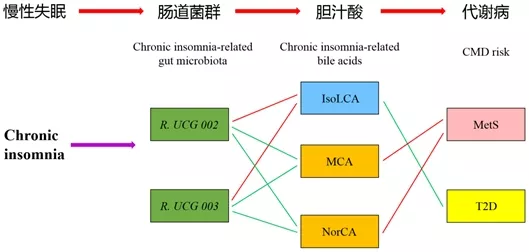On May 30, zhengjusheng, a distinguished researcher of West Lake University, together with chenyuming, a professor of Sun Yat sen University, and zhouhongwei, a professor of Southern Medical University, titled "intestinal flora bile acid axis connects the positive correlation between chronic insomnia and cardiovascular metabolic diseases", and the relevant research results were published online in nature communication.

Research sketch map provided by West Lake University
This study revealed for the first time that the intestinal microorganism bile acid axis may mediate the adverse effects of chronic insomnia on cardiovascular metabolic diseases, identified the main bacteria and bile acids that mediate the positive correlation between chronic insomnia and cardiovascular metabolic diseases, and found that long-term tea drinking habits help to alleviate the imbalance of intestinal flora and bile acid metabolism caused by chronic insomnia.
Zhengjusheng's team cooperates with several domestic teams, taking the Guangzhou nutrition and Health Study (GNHS) as the discovery queue and the Guangdong gut microbiome project (ggmp) as the validation queue, using multi-point follow-up data (average 6.2 years) and high-throughput multi omics data, The changes of intestinal microbiome and bile acid metabolites caused by long-term chronic insomnia were found, and the key mediating role of intestinal microbiome and bile acid in the connection between chronic insomnia and cardiovascular metabolic diseases was revealed.
The GNHS cohort is a cohort of Guangzhou middle-aged and elderly people (45-75 years old) with more than 4000 participants. From the baseline recruitment between 2008 and 2013, all participants were followed up every three years. The ggmp cohort is a large population cohort (18-97 years old) with more than 10000 participants from 14 different regions in Guangdong Province.
This study found the intestinal microbiome and bile acid markers affected by chronic insomnia, and suggested for the first time that chronic insomnia could increase the risk of metabolic diseases by affecting the intestinal microbial bile acid axis. The 6-year long-term dietary follow-up information shows that long-term tea drinking habits help to alleviate the intestinal flora and bile acid metabolism disorder caused by chronic insomnia. The above findings provide new coping strategies and potential intervention targets for preventing or treating the adverse effects of chronic insomnia on metabolic health.
It is reported that jiangzengliang, an assistant researcher of West Lake University, zhuolaibao, a doctoral student of Sun Yat sen University, and Heyan, a professor of Southern Medical University are the co first authors of the paper, and zhengjusheng, chenyuming and zhouhongwei are the co corresponding authors of the paper.